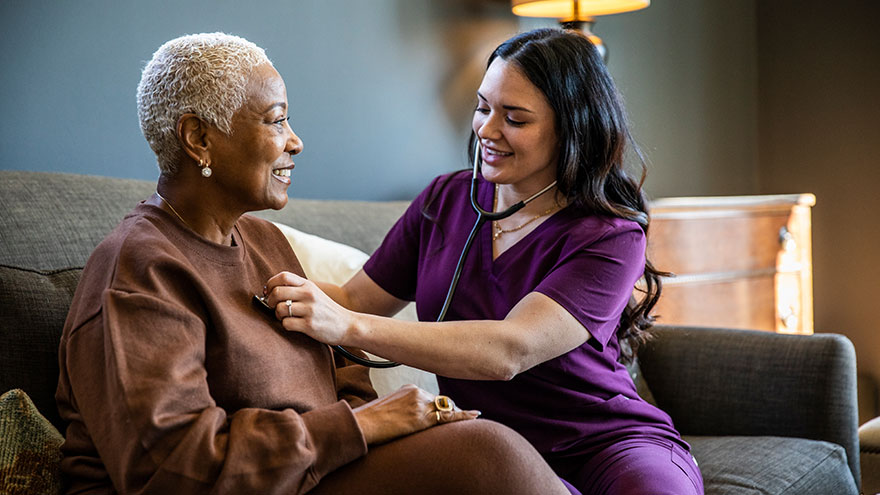Buscar
-
5 Things to Know About Women’s Heart Disease
Heart disease is more common in women than many people think. In fact, it is the leading cause of death in the United States, ahead of cancer and stroke. However, the common signs and symptoms we often associate with men and heart disease don’t always align with women. Thankfully, Renown Health is home to the first women’s heart center in Nevada. The Helaine Greenberg Women’s Heart Center gives women in our community the opportunity to receive exemplary care and education. “At the Women’s Heart Center, we are proud to offer the women of our community the treatments, therapies and education they need to fight this silent killer,” Dr. Danish Atwal. 1. The warning signs for heart disease present differently in women than they do in men. Both men and women may experience chest pain during a heart attack, but the similarity of symptoms ends there. Heart disease is especially problematic for women because more than half of women who die of heart disease have no symptoms at all. Women tend to have subtler symptoms that mimic symptoms associated with common, mild illnesses: Fatigue or weakness Pain, pressure or tightness in the center of the chest Pain that spreads to the upper body, neck or jaw Sweating, nausea or vomiting Sudden dizziness Shortness of breath Trouble sleeping 2. Women are often not treated with the same medications as men, even when they should be. Women are less likely to receive heart medication because their disease is often misdiagnosed or because they do not seek proper care. According to a study done by Harvard Health Publishing in 2020, “A general lack of awareness of women’s heart disease may lead to doctors or patients missing heart attacks in women or delaying their diagnosis. For example, while the frequency of cardiovascular disease tends to be lower in women before menopause than in men, the frequency dramatically increases after menopause, when it accounts for approximately one out of every three deaths in women. 3. Women who have hypertension, high cholesterol, type 2 diabetes or gestational diabetes during pregnancy are at a higher risk of a heart attack in the future. Women who experienced complications related to developing high blood pressure or hypertension during pregnancy had a 63% increased risk for developing cardiovascular disease later in life, as stated by research funded by the National Heart, Lung, and Blood Institute. According to that same study, researchers found that early screenings and monitoring in four target areas – blood pressure, cholesterol levels, glucose levels and body mass index – could provide even more personalized targets to help delay or possibly prevent future cardiovascular events among women.
Read More About 5 Things to Know About Women’s Heart Disease
-
How to Talk to Your Vaccine-Hesitant Friends About Getting Vaccinated Against COVID-19
Roughly 59% of eligible Nevadans are fully vaccinated against COVID-19 as of mid-September. That number is up 9% from only a month ago, but our work is far from done! One of the most powerful ways to convince someone to get vaccinated is for a person they trust and respect to take the time and have that complicated conversation with them. We know these conversations can be daunting, so we consulted Marie McCormack, MD, Primary Care Division Chief at Renown, about the six best ways to approach and frame these conversations to be productive and effective. 1. Be firm, but not aggressive. 2. Listen to what they have to say, and don’t assume you know why they haven't gotten the vaccine yet. 3. Cater your responses to their concerns. The CDC even has a helpful reference table identifying main reasons people are not getting vaccinated. If they are scared, offer to go with them. If they are not worried about getting sick, explain that they are more at risk of infecting those around them who are more likely to have a severe reaction to the virus. If they don’t know how to make an appointment, help them find the most convenient time and place for their schedule. If they are worried about how fast the vaccine was developed, remind them that the mRNA technology used in these vaccines has been studied for years. If they are worried the vaccine will affect fertility, tell them that in August the CDC officially recommended that pregnant people can get vaccinated. 4. When in doubt, hit them with the stats! 1 in 500 Americans has died from COVID-19. Vaccinated people are nearly five times less likely to get infected, according to the CDC. Vaccinated people are 10 times less likely to get so sick they ended up in the hospital, according to the CDC. 5. Remind them of all the things they might not be able to do if they aren't vaccinated. Attend concerts or sporting events Travel Potentially even keep their job 6. When all else fails, use the tough love approach. Tell these people you don’t feel comfortable meeting with them in person until they are vaccinated.

